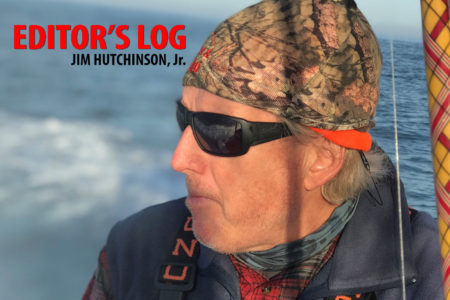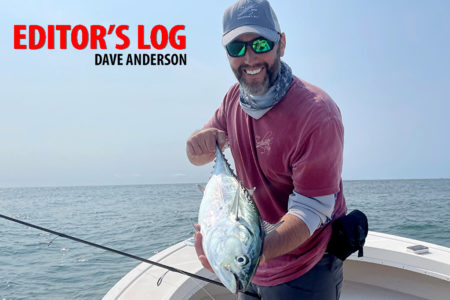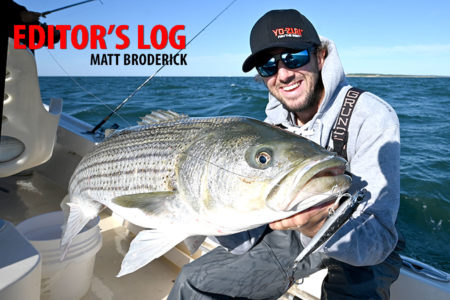“Hey Cap’ get a load of that slob. Is that a pig or what?!”
At risk of being tabbed an oversensitive snowflake, can I ask when we started referring to big fish as pigs and slobs? I guess I just find it strange that a fish like striped bass – practically deified in some angling circles – would be referred to in such ungodly fashion.
Word choice today is a touchy issue, the whole concept of political incorrectness having imploded by polarized pull from opposite ends of the sociopolitical universe. I guess what once was a “trophy” catch must surely be synonymous today with a trip to the taxidermist (insert audible gasp here), while the catch and release shot of a real “slob” only leaves me grasping to understand what is and what is not allowable in terms of published photos and reports.
One thing that’s not allowed is someone advertising or promoting “shared expense” trips without a captain’s license. Some have questioned the reasoning, arguing that having someone pony up cash for gas seems a pretty innocent request. Perhaps in theory; but in practical, legal application, if you’re soliciting money for trips, you need a captain’s license and required permits if you require expense money. Take for example the guy from Maryland nicknamed the O.C. Shark Hunter, busted this summer for guiding shark fishing trips on Assateague Island without a license. Undercover officers allegedly booked a trip for $750 and then charged him for failing to possess a permit. How’d they get him? Social media of course; he was apparently promoting his side business online sharing photos of “allegedly illegal sharks” landed along the beaches of Ocean City, MD. The town has an ordinance against shark fishing, not to mention the fact that he was at a state park and targeting sandbars and sand tigers, which are federally protected species.
In addition to Facebook and Instagram, a whole host of online businesses and phone apps have popped up of late offering onboard charters and “expense sharing” trips. That’s prompted several U.S. Coast Guard investigations, including “Operation PAX Defender” where enforcement folks boarded boats in the Southeast over Labor Day Weekend to check for safety equipment and required documentation. The holiday sting turned up at least two Uninspected Passenger Vessels operating without a credentialed captain at the helm.
An Uninspected Passenger Vessel, or UPV, is any vessel, typically under 100 gross tons, carrying six or fewer passengers for hire. The term “uninspected” refers to the provision under the Passenger Vessel Act of 1993 that vessels carrying six or fewer passengers do not require a Coast Guard inspection. They are still expected to comply with federal law and carry all required equipment with a licensed operator; if one or more persons pay for passage, federal law requires the for-hire vessel to comply with minimum federal safety and personnel licensing. Federal law defines a for-hire passenger as someone “for whom consideration is contributed as a condition of carriage on the vessel, whether directly or indirectly flowing to the owner, charterer, operator, agent, or any other person having an interest in the vessel.” The law was amended in 1999 to exclude “voluntary sharing” of actual expenses, cash or otherwise; in other words, you can offer your buddy gas money, but if your buddy demands cash or promotes shared trips by requiring payment from passengers then he’s at risk of violating federal law.
A few months ago, someone referred to me as Capt. Jim. It was an admirable reference, but I had to correct the guy stating I’m not actually a Captain. To become a Coast Guard approved captain, I’d have to complete a recognized course with professionals like Charter Captains Course or 3B’s Captain’s School that can be found listed in our reports section.
Someday I hope to do just that; even if only to shake my buddies down for gas money while chasing after pigs and slobs!



